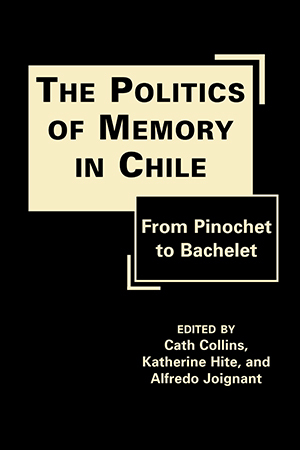How do individual and collective memories of the repressive Pinochet regime affect the fabric of Chilean politics and society today? How have the politics of memory in Chile—including the official policies and symbolic representations that address the painful violations of the past—evolved over the years since Pinochet's demise? The authors of this important new book provide an authoritative assessment of the politics of memory in Chile and consider, as well, the comparative lessons of the Chilean case.
Cath Collins is professor of transitional justice at the University of Ulster and director of the Human Rights Observatory project at the University Diego Portales. She is author of
Post-Transitional Justice: Human Rights Trials in Chile and El Salvador.
Katherine Hite is professor of political science at Vassar College. Her publications include
Politics and the Art of Commemoration: Memorials to Struggle in Latin America and Spain and
When the Romance Ended: Leaders of the Chilean Left, 1968-1998.
Alfredo Joignant is professor of political science at the University Diego Portales. He is author of several books in Spanish, including
Los enigmas de la comunidad perdida and
Un día distinto. Memorias festivas y batallas conmemorativas en torno al 11 de septiembre en Chile, 1974-2006.
Also of interest:
The Pinochet Regime by Carlos Huneeus
"Provides insights into the question of memory and the politics it engages."—Joannie Jean, Historical Dialogues, Justice, and Memory Network
"A rich exploration of how collective memory of the recent past has been debated and transformed since the return of electoral democracy.... This is a significant contribution to the study of collective memory, transitional justice, and Chilean politics."—Michelle D. Bonner, Perspectives on Politics
"[An] illuminating collection.... A work that ably conveys how Chileans sought to come to terms with the fraught legacy of the recent past."—Philip Chrimes, International Affairs
"This exceptionally interesting book clearly establishes that the politics of memory is an important, unresolved, and changing issue in Chile.... One of the most sophisticated studies in this controversial area, it also reveals a great deal about the nature of Chilean democracy since 1990."—Alan Angell, St Antony's College, Oxford






